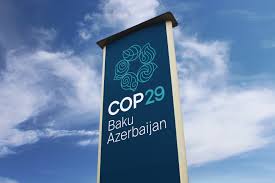As the world prepares for COP29 in Baku, Azerbaijan, Africa once again stands at a critical juncture. Despite contributing less than 4% to global greenhouse gas emissions, the continent remains one of the most vulnerable to the adverse effects of climate change. Rising temperatures, increasingly erratic rainfall patterns, prolonged droughts, and frequent floods have placed immense pressure on food systems, water resources, public health, and overall development. For Africa, the climate crisis is not a looming future threat—it is a present and escalating reality.
COP29 represents a pivotal opportunity to shift global conversations from promises to action, and from sympathy to solidarity. For African nations, this year’s climate summit must go beyond well-meaning declarations. It must deliver tangible commitments, finance, and partnerships that support adaptation, resilience-building, and long-term sustainability.
1. Climate Finance: From Pledges to Disbursement
The $100 billion per year promised under the Paris Agreement for developing countries remains a largely unmet goal. Even more concerning is the imbalance in how this finance is distributed—less than 20% of it is allocated toward adaptation efforts, with the majority focused on mitigation projects that often bypass Africa’s most pressing needs. At COP29, African countries are calling for:
A clear roadmap to meet and exceed the $100 billion annual climate finance commitment.
A 50:50 balance between adaptation and mitigation funding.
More grants-based financing rather than debt-heavy mechanisms.
Climate finance must flow directly to African institutions, local governments, and grassroots actors—not just large international consultancies or intermediaries. Transparent, equitable disbursement mechanisms will be key to restoring trust and accelerating implementation on the ground.
2. Loss and Damage Facility: Operationalizing Support for the Unrecoverable
At COP27, the establishment of a Loss and Damage Fund was hailed as a breakthrough for vulnerable nations. However, without operationalization and adequate capitalization, the fund remains symbolic. For African nations already experiencing irreversible climate loss—such as displacement, desertification, and biodiversity collapse—the need is urgent.
COP29 must:
Ensure that the Loss and Damage Facility is fully operational with dedicated funding channels.
Create simplified access pathways for countries and communities.
Clarify governance structures that empower rather than burden recipient nations.
This isn’t just about financial support—it’s about justice and accountability for historical emissions and systemic inequities.
3. Technology Transfer and Innovation Partnerships
Access to clean and affordable technology remains a barrier to Africa’s energy transition and climate adaptation. While the continent has vast solar, wind, and hydro potential, implementation is often stifled by high costs, lack of capacity, and limited investment.
At COP29, African leaders will push for:
Scaled-up technology transfer agreements under the UNFCCC.
Support for innovation ecosystems in Africa through climate tech incubators.
Open access to patents and climate-smart agricultural tools.
Climate adaptation should not depend on importing expensive, foreign solutions—it must empower African innovation and local ownership.
4. Data Sovereignty and Local Knowledge Systems
Reliable climate data is essential for effective planning, risk reduction, and adaptation. Yet, many African countries rely on foreign climate models, which often miss the nuances of local environments. To enhance sovereignty and precision in climate planning, COP29 should support:
Investment in national meteorological and hydrological systems.
Regional data-sharing platforms and African-led research.
Integration of indigenous knowledge into formal climate planning.
By owning and interpreting their own data, African nations can design solutions that reflect their realities—not global averages.
A Unified Voice for a Just Transition
Africa’s position at COP29 is not just about asking for aid—it’s about demanding fairness, equity, and inclusion in a global system that has long marginalized its voice. With a young, climate-conscious population, an abundance of renewable resources, and a growing innovation landscape, the continent is not just vulnerable—it is also full of potential.
As global leaders gather in Baku, they must recognize that the decisions made at COP29 will determine whether Africa is supported as a climate victim or empowered as a climate leader. The world cannot afford to ignore the crossroads at which Africa stands—because the continent’s resilience is central to our shared climate future.




